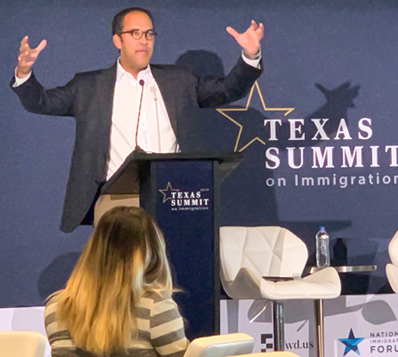Rep Will Hurd (R-TX) Calls for Jam on Congressional Leadership to Pass Immigration Reform
 At the recent Texas Summit on Immigration in Houston, US Representative Will Hurd (R-TX) spoke about the realities and difficulties of trying to pass immigration reform through Congress. He called on constituents and their lawmakers to “jam” congressional leadership in order to pass a bipartisan immigration bill that includes policies that the majority of Americans support because “neither Republican leadership nor Democratic leadership want to solve this problem.” The USA Act he co-sponsored is one such bill.
At the recent Texas Summit on Immigration in Houston, US Representative Will Hurd (R-TX) spoke about the realities and difficulties of trying to pass immigration reform through Congress. He called on constituents and their lawmakers to “jam” congressional leadership in order to pass a bipartisan immigration bill that includes policies that the majority of Americans support because “neither Republican leadership nor Democratic leadership want to solve this problem.” The USA Act he co-sponsored is one such bill.
“The blockage is people want to use this topic as a political bludgeon against their political foes…That’s preventing people from showing a little political courage and preventing people from doing something that in their heart and their minds they agree on. What’s hard for me to understand is consistent polling shows that this is an issue that over two thirds of Americans and over two thirds of Republicans support,” Hurd said.
He also mentioned the American Dream and Promise Act, which he voted for when it passed in the House in June 2019, saying that it’s not going to pass the Senate.
“It’s not gonna go anywhere in the Senate. It didn’t go anywhere in the Senate when Barack Obama was president and had a super majority in the Senate and the House. That’s why we had to start working on something else in the USA Act. The USA Act in my opinion is the minimal viable product,” he said.
The USA Act is a bill Hurd cosponsored that includes improvements to border security and a pathway to legal status for 2.1 million DACA recipients and undocumented immigrants who came to the US as children. The bill failed to reach the house floor for a vote in the 115th Congress when it was held back by Republican leadership in the House, but Hurd believes it would have passed if it went to the floor for a vote. Now, in the 116th Congress, Hurd says Democrat leadership is holding it back.
“We also need to start turning up pressure on Democratic leadership, I say this all the time. Paul Ryan prevented the USA Act from coming to the floor in the 115th congress. Nancy Pelosi is preventing it from coming to the floor in the 116th Congress. The same level of pressure outside groups put on Republicans in the last Congress is the same kind of pressure we should start seeing against our Democratic leadership as well. It’s easy, and everybody was supportive when Republicans were trying to jam Republican leadership, but are we seeing that same level of effort from my colleagues on the other side of the aisle now? The answer is no,” he said.
He called for a “jam” on Democrat House leadership in order to force them to act on immigration reform.
“There is 20% of the Republican party that will never budge on immigration. Ignore em’. There is 20% of the Democrat party that is going to vote no on immigration because it doesn’t go far enough, or ‘we’re not gonna give this president a win on immigration.’ We have to ignore them too. There is no way a bill that solves this problem is going to pass by strict party lines. It has to be done in a bipartisan way, and the leaderships don’t want to see this happen, and that’s why I think we’re going to have to jam them,” he said.
One way to jam congressional leadership is through a discharge petition. If the petition gets enough votes from representatives in the House, it can force congressional leadership to allow a bill to the floor for a vote. Hurd and his colleagues attempted a discharge petition for the USA Act in 115th Congress but fell short.
Hurd says he thinks the current Congress could provide an opportunity to act on immigration reform.
“I actually don’t think that we should think the 116th Congress is done. When there’s all kinds of other drama going on is the exact perfect time to jam people to try to push to make this happen,” he said.
However, he also said that the “abolish ICE” movement and recent increased rates of illegal border crossings could dominate conversations about immigration and make it harder to pass immigration reform.
“The difference in the environment now and during the USA Act is that you have the abolish ICE movement, you have the 1.2 million people who have come here in this current crisis, you have the debate about that which is going to cover a lot of the conversation in which we’re trying to move something like the USA Act,” he said.
He also said the US should be getting more directly involved in improving conditions in the Northern Triangle countries of Guatemala, Honduras, and El Salvador to address a root cause of illegal immigration. This is addressed in Hurd’s USA Act.
“We also need to be pushing on addressing the root causes as well. I’ve been saying Secretary Pompeo should select a special representative for the Northern Triangle. This is a senior diplomat that is going to coordinate all US activity in the Northern Triangle to address structural problems within their economy and their governments that are not addressing violence, extreme poverty, and lack of economic opportunity in those areas. We shouldn’t be cutting off aid to those countries, we should be increasing that aid. We should be thinking of a marshal plan for the Northern Triangle to address the amount of pressure that is happening at our border, because when that is happening, that makes this conversation around DACA even more difficult,” he said.
Hurd also highlighted the need to grapple with the question of “What does merit mean?” While he agreed that PhDs have merit, he also said that “working hard is a skill.”
“For 243 years we have benefited from the brain drain of every other country. I wanna see us continue that, I wanna see us continue to benefit from the hardworking drain as well, we just gotta do it legally,” he said.
Hurd also mentioned that conditions favoring immigration reform could improve as border security improves over time, including next year with the $1.3 billion for physical barriers that he expects will be appropriated when Congress more than likely passes a continuing resolution (CR) instead of an omnibus funding bill.
“I think we’re going to end up with a year-long CR because I don’t think there’s any appetite right now to come to some kind of an omnibus. So does having a year-long CR which ultimately means $1.3 billion for physical barriers along the border, is that enough to create an environment to try to get something done?” he said.








